Helen Lowe's Blog, page 285
September 13, 2011
A Peek Inside Tales for Canterbury: Neil Gaiman's "Inventing Aladdin"

Cashel Mall, in the centre of Christchurch, pre earthquake
As you know, I've been running the "peek inside" series for a while now, giving readers a taste of the Tales for Canterbury anthology, out together by Cassie Hart and Anna Caro to raise funds for Christchurch's earthquake recovery. So it would be wonderful to keep interest in the anthology going and those orders coming in.
Up until now, all the featured stories have been from the "Hope" section of Tales for Canterbury. Today though, I'm breaking the mould and bringing you the first "peek inside" from the "Survival" section of the anthology—Neil Gaiman's Inventing Aladdin.

"Cashel Mall" now
The photos—well, they're just to give you an idea of part of what "survival" means in Christchurch right now. Sure, there's probably lots of worse stuff happening somewhere in the world, maybe a whole lot of places, but this is my city and my community … To orientate yourself, note the position of the Bridge of Remembrance —at the far end of the mall in the first photo, and a whole lot more visible in the second.
But now, without further ado—a peek inside Inventing Aladdin:
.
Inventing Aladdin
by Neil Gaiman
In bed with him that night, like every night,
her sister at their feet, she ends her tale,
then waits. Her sister quickly takes her cue,
and says, "I cannot sleep. Another, please?"
Scheherazade takes one small nervous breath
and she begins, "In faraway Peking
there lived a lazy youth with his mama.
His name? Aladdin. His papa was dead…"
.
—
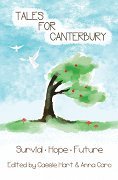 To read the rest of Neil Gaiman's tale of Scheherazade inventing Aladdin, hie thee to Tales for Canterbury, which may be purchased from Random Static, here.
To read the rest of Neil Gaiman's tale of Scheherazade inventing Aladdin, hie thee to Tales for Canterbury, which may be purchased from Random Static, here.
September 12, 2011
Tuesday Poem: "Cargoes" by John Masefield
QUINQUIREME of Nineveh from distant Ophir,
Rowing home to haven in sunny Palestine,
With a cargo of ivory,
And apes and peacocks,
Sandalwood, cedarwood, and sweet white wine.
Stately Spanish galleon coming from the Isthmus,
Dipping through the Tropics by the palm-green shores,
With a cargo of diamonds,
Emeralds, amythysts,
Topazes, and cinnamon, and gold moidores.
Dirty British coaster with a salt-caked smoke stack,
Butting through the Channel in the mad March days,
With a cargo of Tyne coal,
Road-rails, pig-lead,
Firewood, iron-ware, and cheap tin trays.
.
by John Masefield, 1878-1967
from Ballads and Poems, 1923
—
On May 24 I featured Masefield's poem, The Ballad of Sir Bors, from the same collection, and quoted Carcanet Press's bio from their 2005 publication, Sea Fever: Selected Poems of John Masefield (ed. Philip Errington):
"John Masefield (1878-1967) is one of the great storytellers of English poetry, a spinner of yarns and ballads of tall ships and exotic seas, of the deep-rooted life of the rural England in which he grew up, and of the great narratives of Troy and Arthurian legend. Some included here – 'Sea-Fever' and 'Cargoes' – are among the best-loved poems in English …"
When I first encountered Cargoes as a young reader, I loved the romance of the first two stanzas—the "quinquireme of Nineveh" and the "stately Spanish galleon" as well as the sense of adventure redolent in locales such as "distant Ophir" and the hinted at Spanish Main. As a somewhat older reader I felt a far greater appreciation of their juxtaposition with that "dirty British freighter with a salt-caked smoke stack"—and the humorous irony of a cargo of "cheap tin trays" when compared with "apes and peacocks" or "gold moidores." (Which reminds me, isn't it international Talk Like A Pirate Day very soon?)
—
Over on the Tuesday Poem Hub, convenor Mary McCallum is marking the tenth anniversary of September 11, 2001 with a clip of New Jersey poet Deborah Garrison reading four poems about New York, recorded on a subsequent September 11. Do head on over and check it out.
You can also read a transcript of Billy Collins'—who was US poet laureate in 2001—September 11 tribute poem to the victims, The Names, .
September 11, 2011
Writers' Tea Party Reprise
The Writers' Tea Party at the the Hurunui Memorial Library in Amberley, has now come and gone—but I had a great time.
I was reading with fellow authors James Norcliffe and Joanna Orwin and we met up first at a local eaterie, Brew Moon (and I have to say, although I am generally not much of a beer drinker, I tried their Hophead IPA and it was good!) Writing is a solitary occupation so meeting up with other writers is always fun. I know Jim through poetry circles, but it was the first time I had met Joanna and I certainly hope to have the opportunity again.
On arriving at the library it was also great to see some faces I knew, including people who had driven out from Christchurch—definitely very much appreciated!
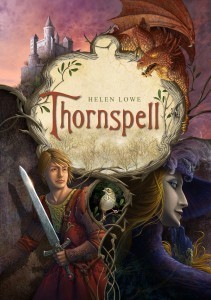 The Tea Party itself involved each writer speaking/reading for half an hour, followed by an actual tea party with cakes and sandwiches. (V. good, as Bridget Jones—she of diary fame—would say!) I was first off the blocks and talked about my love of Fantasy and the moment when the Thornspell story first sparked, and why—with two readings: the first from "The Silent Wood," when the hero, Sigismund, meets Auld Hazel; the second from "The Boar Hunt."
The Tea Party itself involved each writer speaking/reading for half an hour, followed by an actual tea party with cakes and sandwiches. (V. good, as Bridget Jones—she of diary fame—would say!) I was first off the blocks and talked about my love of Fantasy and the moment when the Thornspell story first sparked, and why—with two readings: the first from "The Silent Wood," when the hero, Sigismund, meets Auld Hazel; the second from "The Boar Hunt."
(Both sequences by the way, were featured as part of my recent "Fun with Thornspell" series, here for Auld Hazel, while the boar hunt is here.)
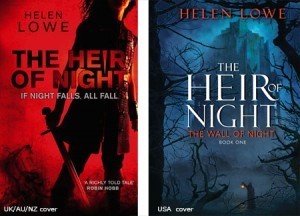 I then spoke about the different forces at play in The Heir of Night and WALL series, including that it's a darker story and more strongly influenced by the epic and tragic elements of myth. I read Malian's call to arms, from the chapter of the same name, and the later Gate of Dreams sequence where Kalan meets the Huntmaster for the first time (again, from the chapter titled "The Huntmaster.")
I then spoke about the different forces at play in The Heir of Night and WALL series, including that it's a darker story and more strongly influenced by the epic and tragic elements of myth. I read Malian's call to arms, from the chapter of the same name, and the later Gate of Dreams sequence where Kalan meets the Huntmaster for the first time (again, from the chapter titled "The Huntmaster.")
And that was my half hour done! But I enjoyed having the opportunity to read, because one thing I always feel is that story is not just about words written on the page—story is meant to be heard and that means the writing must work equally well when read aloud. So I hope Thornspell and The Heir of Night pass that test—but I certainly enjoyed listening to both Joanna and Jim talk about and read from their work.
[image error]Joanna Orwin is primarily a Childrens' and YA author, with a focus on New Zealand stories and themes. She has a considerable number of books to her name, several of which have won major awards. I was particularly intrigued by her reading from Owl and have been interested in reading Collision for some time, given my interest in history and cultural interaction in particular.
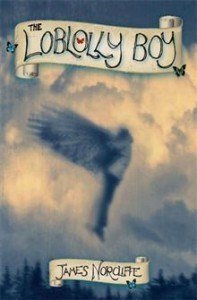 James Norcliffe is well known as both a poet and a novelist. You may recall that he was one of the guest authors who posted as part of my "Why Fantasy-SciFi Rocks My World" series to celebrate the Australia/New Zealand launch of The Heir of Night last year—and you can read his guest post here. (Believe me, it's worth it!) His Junior novel, The Loblolly Boy, (published as The Boy Who Could Fly in the US) was one of my recommended SpecFic stocking fillers on The Realm last Christmas—and probably far more importantly (;-)), featured on the 2011 USBBY Outstanding International Books List. Yesterday, Jim was reading from his poetry and entertained us all with his sly humour, keen observation, and insight into human nature.
James Norcliffe is well known as both a poet and a novelist. You may recall that he was one of the guest authors who posted as part of my "Why Fantasy-SciFi Rocks My World" series to celebrate the Australia/New Zealand launch of The Heir of Night last year—and you can read his guest post here. (Believe me, it's worth it!) His Junior novel, The Loblolly Boy, (published as The Boy Who Could Fly in the US) was one of my recommended SpecFic stocking fillers on The Realm last Christmas—and probably far more importantly (;-)), featured on the 2011 USBBY Outstanding International Books List. Yesterday, Jim was reading from his poetry and entertained us all with his sly humour, keen observation, and insight into human nature.
Afterward we got to enjoy that fabulous afternoon tea put on by the Friends of the Library and chat with the library supporters. I think anyone experiencing the lovely Hurunui Memorial Library will see what a great job of supporting reading and literacy they're doing within their community.
—
My Next Event: is another Friends of the Library event, this time in Christchurch at the South Library on Tuesday 18 October.
September 10, 2011
Just Arrived: "Shift" by Rhian Gallagher
 On Tuesday 23 August, as editor on the Tuesday Poem Hub, I featured Rhian Gallagher's poem, Butterfly, from her new collection Shift, which is being published by both Auckland University Press, here in NZ, and Enitharmon in the UK.
On Tuesday 23 August, as editor on the Tuesday Poem Hub, I featured Rhian Gallagher's poem, Butterfly, from her new collection Shift, which is being published by both Auckland University Press, here in NZ, and Enitharmon in the UK.
You can read Butterfly here.
Yesterday, I received my own copy of Shift in the post—and am very much looking forward to getting in amongst this new collection of Rhian Gallagher's poetry. I hope to tell you more about it soon, but in the meantime, here's what the back cover says:
"Rhian Gallagher's second collection encompasses a departure from London, where she lived for eighteen years, and a return to the pines and paddocks of the South Island. This mid-life shift involves acts of retrieval, confrontations with loss and movements towards renewal: 'Belonging was always touch / touch and go.' At the heart of the book is an intimate testament to a relationship – sensual, direct, contradictory – celebrating the evolution of deep connection between two women. Meditative, at times urgent, this evocative collection will earn Rhian Gallagher a well-deserved place in the New Zealand poetic landscape."
In addition to Butterfly, you can read another poem from Shift, Lagoon, on Helen Heath's blog, here.
September 9, 2011
What I'm Reading: "The Passage" by Justin Cronin
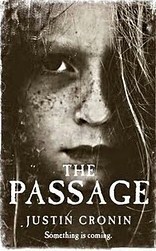 It's been quite some time—December 19, in fact—since I said that I had The Passage on my To Be Read table, mainly because I've been so flat out writing and then editing The Gathering of the Lost, dealing with earthquakes and their aftermaths, and reading all the Hugo Award fiction finalists ,that everything else has pretty much taken a back seat.
It's been quite some time—December 19, in fact—since I said that I had The Passage on my To Be Read table, mainly because I've been so flat out writing and then editing The Gathering of the Lost, dealing with earthquakes and their aftermaths, and reading all the Hugo Award fiction finalists ,that everything else has pretty much taken a back seat.
Also, I had heard so much buzz about The Passage that I wanted to allow myself the time to do it justice. This feeling was underscored when I dipped into the first fifty-odd pages and gained the impression that it was definitely a "big" book.
Now that I have finally read it, I can say that while I enjoyed the book overall, I am not quite sure what I really think about it.
[image error]Just to give you an idea of the basic story, The Passage is post-apocalyptic, speculative fiction, of the kind that has been getting some traction with mainstream readers over recent years, eg Cormac McCarthy's The Road and Margaret Atwood's Oryx and Creyke. In this case, the apocalypse is brought about by a vampire virus, nurtured by military biological weapons' researchers, that (literally) "breaks out" of the lab. In terms of the basic premise, therefore, I found The Passage similar to both Max Brooks' World War Z: An Oral History of the Zombie War and more recently, Mira Grant's Feed. There were also, I thought, a few nods to Joss Whedon's long-running Buffy the Vampire Slayer TV series: e.g. the Initiative (Series 4), the Anointed child vampire (Series 1 and early 2), and a young woman "watcher" (militia-style soldier) later in the book who has definite "Slayer-esque" qualities.
 The time span of The Passage is longer than either World War Z or Feed, being around 90 years, and so the exploration of the effects on society–or in fact, several societies—takes that into account. And there's a lot of good stuff in that exploration and in the characters that the story follows, as well as the fact that you would definitely not term any of these vampires "sparkly." The story being told was definitely interesting as well: no question, this book kept me turning the pages all the way through.
The time span of The Passage is longer than either World War Z or Feed, being around 90 years, and so the exploration of the effects on society–or in fact, several societies—takes that into account. And there's a lot of good stuff in that exploration and in the characters that the story follows, as well as the fact that you would definitely not term any of these vampires "sparkly." The story being told was definitely interesting as well: no question, this book kept me turning the pages all the way through.
So why do I say that I am not quite sure what I think? Mainly, I suspect, this is because I have so many quibbles that other aspects of the book don't fully over-ride. These include early characters who seem important to the unfolding story, and yet simply drop out of the later stages of the book. I particularly note the proto-vampires, Fanning (Zero) and Carter in this respect. There were also elements in the plot that didn't seem to fit together. For example, in the early stages of the story, Fanning was the Zero, but toward the end the term appeared to refer to Amy. And I was never really clear as to exactly "what" Amy was, as her powers and unqiue character appeared to predate her infection with the vampire virus—but the how/what of that was never addressed. I also had some reservations around character development in the later stages of the book: somehow they just did not seem as convincing or real as in the first, pre-apocalypse section. When, as a reader, I am not sure why characters like/are attracted to each other, and yet they are major point-of-view characters, this detracts from enjoyment of the story, no matter how action packed it may be.
So at the end, I was definitely left with the feeling that this story was unfinished—that there must be another book in the wings that would further explore and develop a lot of these confusing/unfinished elements. And perhaps some of the remaining characters as well.
As appeal to the great oracle of "te web" has indicated that The Passage is indeed the first instalment of an intended trilogy, I can definitely say that I will be reading the forthcoming instalment. Perhaps with a slight sense of reservation and wanting to be convinced still, on some points—but nonetheless, looking forward to the opportunity to read on.
And perhaps the most telling point—despite quibbles and reservations, ever since I finally closed the back cover, I have been thinking about the story and the characters. The Passage, it seems, has staked a claim on the territory of my imagination.
Last Call for Writers' Tea Party
Yes indeed, roll up, roll up—for the last call for tomorrow's Writers' Tea Party, to commence 2 pm at the Hurunui Memorial Library in Amberley, just north of Christchurch.
I understand I'll be first up to talk a little bit about my writing and read from both Thornspell and The Heir of Night. My fellow authors James Norcliffe and Joanna Orwin will also be speaking and reading from their work—and afterward there'll be tea, 'cucumber sandwiches', and maybe a little book signing, too … 
So if you're in the vicinity or feel like a Sunday afternoon drive northward, do consider coming along!
—
And I should be back with a "What I'm Reading Post" a little later today.
September 8, 2011
"Kind van de Nacht" Is Here!
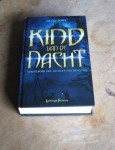 You may recall that Kind van de Nacht, the Dutch edition of The Heir of Night, was published in The Netherlands on 18 July by Luitingh Fantasy—and yesterday I received my author's editions in the post.
You may recall that Kind van de Nacht, the Dutch edition of The Heir of Night, was published in The Netherlands on 18 July by Luitingh Fantasy—and yesterday I received my author's editions in the post.
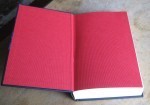 I know I said earlier how much I love the treatment Luitingh have given the blue USA cover. But now I have to add that I love the treatment they have given to the book itself. It's hardcover, which I'm old fashioned enough to think is classy, and the inside cover is this gorgeous red, with corrugated paper.
I know I said earlier how much I love the treatment Luitingh have given the blue USA cover. But now I have to add that I love the treatment they have given to the book itself. It's hardcover, which I'm old fashioned enough to think is classy, and the inside cover is this gorgeous red, with corrugated paper.
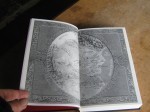 And then there's the title page, and the map with all the place names translated into Dutch—all very cool.
And then there's the title page, and the map with all the place names translated into Dutch—all very cool.
One of the people I will be making a point of showing this book to, and giving her a copy if she would like one, is a lady called Ria, who is both the mother of a friend, and as someone raised in The Netherlands, one of the few people I know who can actually read Dutch! 
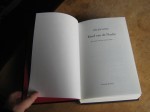 While I am not sure if Kind van de Nacht's style of epic fantasy is the kind of story Ria enjoys, a reason I would like to share the Dutch translation is because one of her stories—from her childhood memories of Holland during the German occupation of World War 2, and of her father hiding between the ivy and the roof when forced labour drives were going house to house—informs an incident that occurs in The Gathering of the Lost.
While I am not sure if Kind van de Nacht's style of epic fantasy is the kind of story Ria enjoys, a reason I would like to share the Dutch translation is because one of her stories—from her childhood memories of Holland during the German occupation of World War 2, and of her father hiding between the ivy and the roof when forced labour drives were going house to house—informs an incident that occurs in The Gathering of the Lost.
So there is a kind of symmetry in the first translation of The Wall of Night series being into Dutch, since there is a Dutch influence on an aspect of the story—well, I think so anyway!
"Kind Van Der Nacht" Is Here!
 You may recall that Kind van der Nacht, the Dutch edition of The Heir of Night, was published in The Netherlands on 18 July by Luitingh Fantasy—and yesterday I received my author's editions in the post.
You may recall that Kind van der Nacht, the Dutch edition of The Heir of Night, was published in The Netherlands on 18 July by Luitingh Fantasy—and yesterday I received my author's editions in the post.
 I know I said earlier how much I love the treatment Luitingh have given the blue USA cover. But now I have to add that I love the treatment they have given to the book itself. It's hardcover, which I'm old fashioned enough to think is classy, and the inside cover is this gorgeous red, with corrugated paper.
I know I said earlier how much I love the treatment Luitingh have given the blue USA cover. But now I have to add that I love the treatment they have given to the book itself. It's hardcover, which I'm old fashioned enough to think is classy, and the inside cover is this gorgeous red, with corrugated paper.
 And then there's the title page, and the map with all the place names translated into Dutch—all very cool.
And then there's the title page, and the map with all the place names translated into Dutch—all very cool.
One of the people I will be making a point of showing this book to, and giving her a copy if she would like one, is a lady called Ria, who is both the mother of a friend, and as someone raised in The Netherlands, one of the few people I know who can actually read Dutch! 
 While I am not sure if Kind van der Nacht's style of epic fantasy is the kind of story Ria enjoys, a reason I would like to share the Dutch translation is because one of her stories—from her childhood memories of Holland during the German occupation of World War 2, and of her father hiding between the ivy and the roof when forced labour drives were going house to house—informs an incident that occurs in The Gathering of the Lost.
While I am not sure if Kind van der Nacht's style of epic fantasy is the kind of story Ria enjoys, a reason I would like to share the Dutch translation is because one of her stories—from her childhood memories of Holland during the German occupation of World War 2, and of her father hiding between the ivy and the roof when forced labour drives were going house to house—informs an incident that occurs in The Gathering of the Lost.
So there is a kind of symmetry in the first translation of The Wall of Night series being into Dutch, since there is a Dutch influence on an aspect of the story—well, I think so anyway!
September 7, 2011
Done!
Yes, The Gathering of the Lost copyedit is actually done and completed, with all 3 stages of the marked up manuscript now on their way back to New York—and everything going well should be on my editor's desk by Friday 12, US time.
So you may recall that on August 20—when I had just rustled up a hardcopy ms to work off, despite that week's big snow, which meant that the courier packet from NY didn't actually arrive until Monday 22, a week after it was sent—I said that the publisher had indicated that Gathering should be back by 31 August (ie back in the production department in New York, not just off my desk here in NZ.) And I had said that I thought 12 September was a more realistic date—and so it has proven to be (or will be, assuming the courier makes it to NY within their promised delivery timeframe!)
3-4 weeks of very hard, attention-to-detail work—but worth it both to get the book as right as I can make it. And to have the opportunity to read the story through again and think: yes, that's definitely a book!
The next and final stage for me, prior to actual publication, is the "first pass proof", which will be that last going over to make sure that everything from the copyedit is A-OK. And although there's still six months to go until then, I hope to have a "cover reveal" sometime before then. A little bit of fun stuff to leaven out the hard work!
But for now … Well, to be honest, a fair bit of catch-up around house and garden as well as doing earthquake related stuff, which is just an ongoing these days. But also, onward to Daughter of Blood, The Wall of Night Book Three!
Book Three, though-–how cool is that?!
September 6, 2011
Around The Traps
As I am putting the final touches on the copyedited manuscript of The Gathering of the Lost today, prior to sending the last few pages off, I thought I'd point you to a few fun things happening around other blogs:
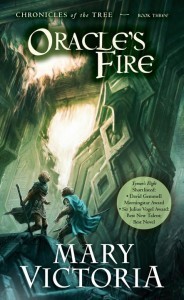 Mary Victoria, author of Tymon's Flight and Samiha's Song, with Oracle's Fire, the third in her Chronicles of the Tree series forthcoming in October, has a great series running at the moment—an illuminated dictionary of the world of the Tree! Today the series is up to "D for Dirigible", but I am putting the link to the post where Mary introduces the series, here (And you can just click forward from there to each of the entries.)
Mary Victoria, author of Tymon's Flight and Samiha's Song, with Oracle's Fire, the third in her Chronicles of the Tree series forthcoming in October, has a great series running at the moment—an illuminated dictionary of the world of the Tree! Today the series is up to "D for Dirigible", but I am putting the link to the post where Mary introduces the series, here (And you can just click forward from there to each of the entries.)
—
 For those who love paranormal romance, Nalini Singh is celebrating the release of a new book, Archangel's Blade on her blog today. You can check out the post here.
For those who love paranormal romance, Nalini Singh is celebrating the release of a new book, Archangel's Blade on her blog today. You can check out the post here.
 And over on the Supernatural Underground Amanda Arista has posted about the literary influences on her own writing and the origins of her own Diaries of an Urban Panther. It's a great post and you can check it out here.
And over on the Supernatural Underground Amanda Arista has posted about the literary influences on her own writing and the origins of her own Diaries of an Urban Panther. It's a great post and you can check it out here.
—
 Tim Jones has the itinerary for the tour to promote his new poetry collection, Men BrieflyExplained (isn't that a great title?), available on his blog here. I have already seen a few of the poems and I think this is going to be a great book—and a great series of launch events.
Tim Jones has the itinerary for the tour to promote his new poetry collection, Men BrieflyExplained (isn't that a great title?), available on his blog here. I have already seen a few of the poems and I think this is going to be a great book—and a great series of launch events.
.
—
Over on SFSignal they have a great feature on "SFF Art: A Few Words on a Thousand Pictures"—definitely worth a read! (As is their whole site, in fact.)
—
And recently, Jan Butterworth from SFFANZ sent me through this interesting link to a post by French SFF writer Aliette de Bodard "On the Prevalence of US Tropes in Storytelling"—I am not sure I am convinced that all the examples she cites are such exclusively US tropes, but I would love to know what you think.
.
(Btw, Aliette de Bodard's "The Jaguar House, in Shadow", Asimov's, July 2010, was nominated for the Hugo Award for Best Novelette this year.)



